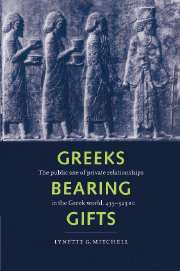Book contents
- Frontmatter
- Contents
- Preface
- Abbreviations
- 1 Philia
- 2 Philia and the polis
- 3 Philia and political activity
- 4 Magisterial appointments: Sparta
- 5 Magisterial appointments: Athens
- 6 Persia and the Greeks
- 7 Athenians and Thracians
- 8 Philip and the Greeks
- 9 Alexander
- 10 Friendship and ideology
- Appendix I Magistrates with connections
- Appendix II Notes on magistrates for the years 435–323 BC
- Bibliography
- Indexes
- Frontmatter
- Contents
- Preface
- Abbreviations
- 1 Philia
- 2 Philia and the polis
- 3 Philia and political activity
- 4 Magisterial appointments: Sparta
- 5 Magisterial appointments: Athens
- 6 Persia and the Greeks
- 7 Athenians and Thracians
- 8 Philip and the Greeks
- 9 Alexander
- 10 Friendship and ideology
- Appendix I Magistrates with connections
- Appendix II Notes on magistrates for the years 435–323 BC
- Bibliography
- Indexes
Summary
And I saw a new heaven and a new earth: for the first heaven and the first earth were passed away; and there was no more sea.
Revelation 21.1Even as Philip lay dead, Alexander was acclaimed as Philip's heir and as successor to the Macedonian throne. It is a commonplace that this marked the beginning of a new era, as Alexander became the conqueror of his new empire and set himself down in history as Alexander the Great. Alexander's reign is interesting not least because here we capture a moment of change, and from this point on there is a new range of questions to ask. Although many of the patterns we have seen in his father's reign are repeated in Alexander's own (perhaps practised with less subtlety and finesse), from Alexander's conquest of Asia we are dealing less with Macedonian–Greek relations, and more with relations between a Greco-Macedonian elite and their Asiatic subjects. As a result Alexander's reign in many ways foreshadows the new tensions and difficulties that were to present themselves to the Hellenistic world. In this chapter we shall consider Alexander's career, his failing relationship with his Macedonian troops and his new relationships with those within his empire, both looking backwards as well as forwards, and picking up old themes and presenting them in a new light.
Alexander and gift-giving
Like his father, Alexander was well known for his gift-giving, and showed great respect for the institutions of friendship.
- Type
- Chapter
- Information
- Greeks Bearing GiftsThe Public Use of Private Relationships in the Greek World, 435–323 BC, pp. 167 - 177Publisher: Cambridge University PressPrint publication year: 1998

